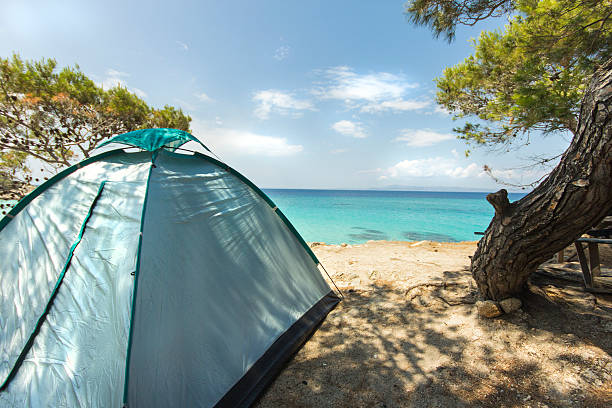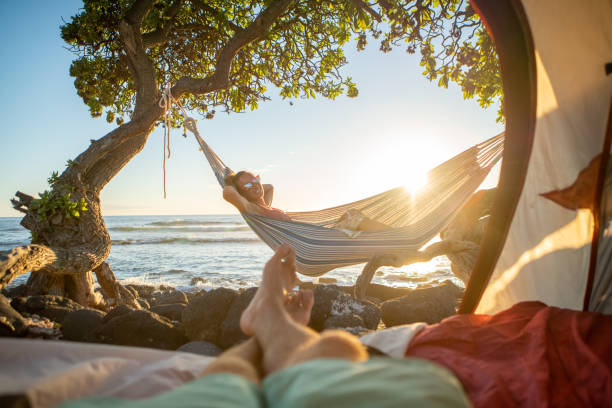Camping on the beach can be an incredible experience, offering a unique blend of adventure and relaxation with the soothing sound of waves as your nightly lullaby. In South Australia, the rules regarding beach camping vary by location. While some pristine shores invite campers to spend the night under the stars, other areas are protected, and camping may be restricted to preserve the natural environment. To ensure a blissful camping trip along South Australia’s stunning coastline, it’s crucial to understand the regulations and secure the right permits before setting up your tent.
The Best Beaches for Camping in South Australia

South Australia boasts numerous stretches of beach that are perfect for camping. However, not every beach welcomes overnight stays. Here’s a selection of top spots where you can legally camp by the water’s edge:
- Coorong National Park – Famed for its lagoons, this park offers designated camping areas near the beach.
- Lincoln National Park – Known for its bays and sandy beaches where you can camp with a permit.
- Coffin Bay National Park – Another location with allocated zones for beach campers.
- Canunda National Park – Offers spectacular coastal views and suitable beach camping spots.
- Yorke Peninsula – Certain beaches here allow camping, provided you adhere to the local council rules.
Each of these locations has its own unique charm and regulations. When planning your camping trip, remember to check the latest information from the relevant park authorities or local councils to ensure that you’re camping legally and safely.
Understanding the Rules and Regulations
When camping on South Australia’s beaches, it’s not as simple as pitching a tent wherever you please. There are specific rules in place to protect the wildlife, the dunes, and the overall integrity of the coastline. For instance:
- Camping may only be permitted in designated areas to minimize environmental impact.
- A camping permit or fee may be required, which can usually be obtained from the park office or local council.
- Fires may be banned or restricted to designated fire pits to prevent bushfires and protect the environment.
- There could be limitations on the duration of your stay to allow for equitable access to camping spots and to reduce environmental strain.
- Some areas may have specific quiet hours to ensure all visitors can enjoy the tranquility of the setting.
- Always take your rubbish with you or use provided facilities to keep the beaches clean.
It’s essential to respect these guidelines to preserve the beauty and accessibility of beach camping for future visitors and to avoid fines or penalties for non-compliance.
Preparation and Safety Tips
Safe and enjoyable beach camping in South Australia requires preparation. Here are some tips to help you plan:
- Check weather forecasts in advance to avoid camping during storms or high winds.
- Invest in a high-quality tent that can withstand the sandy environment and potential gusty sea breezes.
- Bring along sufficient water, as not all beach camping spots have easy access to fresh water sources.
- Pack out what you pack in; including all trash, to keep the beaches pristine for wildlife and other campers.
- Be aware of the tide schedules to avoid setting up your camp in a spot that could be inundated.
- Use environmentally friendly products, from sunscreen to dish soap, to protect the ocean and wildlife.
Bearing in mind these considerations will not only ensure your safety but also contribute to a more environmentally conscious camping experience.
Respecting Wildlife and the Environment
Camping on the beach in South Australia comes with a responsibility to the abundant wildlife and delicate ecosystems. Some beaches are nesting grounds for birds and other sea creatures, and it is imperative to disturb these areas as little as possible. Stick to marked paths to avoid trampling vegetation, observe local wildlife from a distance, and never leave food or waste behind. Consider the principle of ‘leave no trace’ to minimize your impact on these natural habitats. This way, you contribute to the ongoing conservation efforts and ensure that the majestic beauty of South Australia’s beaches can be enjoyed for generations to come.
Conclusion
In summary, while you can camp on certain beaches in South Australia, it is not a universal allowance and comes with a set of rules to follow. Before you head out, be sure to research the specific beach you’re interested in, acquire the necessary permits, and prepare for a safe and environmentally friendly trip. Respecting the regulations and the natural environment will help ensure that beach camping remains a viable and enjoyable option in this beautiful part of Australia.
